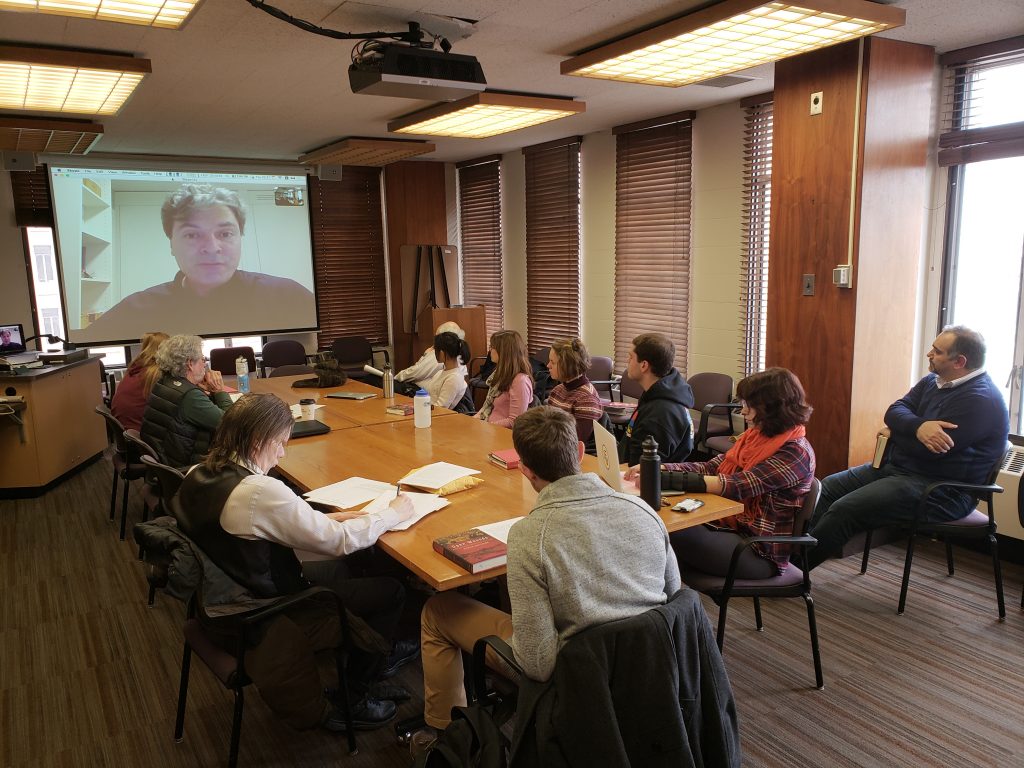This spring, CHGS offered a class titled, “The Armenian Genocide in the Age of Alternative Facts.” This course was designed to discuss the historical origins, the social context, and the consequences of the Armenian Genocide in a modern key. As such it consisted of three parts: the Genocide itself, it effects on the Armenian and Turkish communities, and the persistent denialist discourse, i.e. the alternative facts angle. In all, the class had about a dozen students, each bringing different backgrounds and knowledge of the Genocide to the class discussions. We read two books, Goodbye, Antoura: A Memoir of the Armenian Genocide and Open Wounds: Armenians, Turks and a Century of Genocide, by Karnig Panian and Vicken Cheterian respectively. Panian’s book recounted the author’s childhood experiences in the desert of Der el Zor and subsequently in the orphanage at Antoura, set up by the Ottoman government to Turkify orphaned Armenian children. While Cheterian’s work dealt with the historical and political component of the aftermath of the Genocide. Cheterian also guest lectured to the class via Skype from Switzerland. The latter part of the class dealt with academic denialism of the Armenian Genocide grounded in an alternative or parallel interpretational framework that seeks to justify, negate, question, or minimize its reality.
We read two books, Goodbye, Antoura: A Memoir of the Armenian Genocide and Open Wounds: Armenians, Turks and a Century of Genocide, by Karnig Panian and Vicken Cheterian respectively. Panian’s book recounted the author’s childhood experiences in the desert of Der el Zor and subsequently in the orphanage at Antoura, set up by the Ottoman government to Turkify orphaned Armenian children. While Cheterian’s work dealt with the historical and political component of the aftermath of the Genocide. Cheterian also guest lectured to the class via Skype from Switzerland. The latter part of the class dealt with academic denialism of the Armenian Genocide grounded in an alternative or parallel interpretational framework that seeks to justify, negate, question, or minimize its reality.
Artyom Tonoyan (Ph.D., Baylor University) is Education Program Specialist at the Center for Holocaust and Genocide Studies. He is also a visiting Research Fellow at the Institute of Archaeology and Ethnography, National Academy of Sciences of Armenia. His research interests include sociology of religion, religion and politics in the Caucasus, and the contemporary effects of the Armenian Genocide.
Editor’s Note: CHGS wanted to share some of the positive feedback from students in Artyom’s class:
“His breadth of knowledge on the topic was unsurpassed.”
“An outstanding learning experience…”
“The instructor gave us heartfelt lectures based on impressive academic research as well as his personal background experience.”
“Prof. T. presented a wide variety of information about the Armenian G and its denial and helped me see the context of why it is important.”
“AT (Artyom Tonoyan) is a driven, brilliant, and kind professor. He is deeply invested in his studies, has a knack for making the class enjoyable despite how hard the content is, and really invested in me as a student.
“Give him more lecture days!”
“Dr. Tonoyan is an excellent and thorough scholar that creates a positive classroom environment. His lectures were excellent.”

Comments